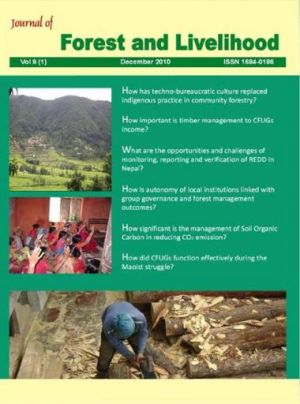Prospects of Soil Organic Carbon Sequestration: Implications for Nepal’s Mountain Agriculture
DOI:
https://doi.org/10.3126/jfl.v9i1.8593Keywords:
climate change, carbon emission, soil, farm manureAbstract
Agricultural land is one of the major sources of carbon dioxide (CO2) emission, which results in an increase of the CO2 concentration in the atmosphere. The conversion of biomass rich land like forests to agricultural land results in the release of carbon into the atmosphere. Once the CO2 enters into the atmosphere, it remains as a potent greenhouse gas for decades unless it is absorbed by plants through photosynthesis. Therefore, there is a need for abating CO2 emissions by enhancing carbon sequestration. Soils store twice as much carbon than vegetation and two thirds more than the atmosphere, and thus can store a significant quantity of CO2. Unsustainable farming leads to land degradation and the release of soil organic carbon (SOC). SOC may return directly to the atmosphere from the soil when organic material decays through decomposition or burning. SOC is important not only to maintain and enrich soil nutrients, but also in preventing the release of carbon in the forms of CO2 and Methane (CH4) into the atmosphere. Mountain agricultural land is sensitive to extreme weather events, such as heavy precipitation or long periods of drought. Such extreme events can trigger high soil erosion leading to losses of SOC. Hence, enhancing and conserving SOC is important for reducing soil erosion and the emission of greenhouse gases from lands, and to maintain a high moisture holding capacity of the soils. In many parts of Nepal, farmers have adopted various soil management practices in an effort to preserve fertile soils, which in many cases contribute to the reduction of carbon emissions.
DOI: http://dx.doi.org/10.3126/jfl.v9i1.8593
Journal of Forestry and Livelihood Vol.9(1) 2010 45-56
Downloads
Downloads
Published
How to Cite
Issue
Section
License
CC-BY-NC: This license allows reusers to distribute, remix, adapt, and build upon the material in any medium or format for noncommercial purposes only, and only so long as attribution is given to the creator.





